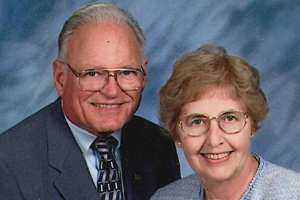Giving to Purdue
University Development Office
Professors' endowment ensures research passion continues
Astronaut Buzz Aldrin predicted humans will be living on Mars by the year 2035. As this gets closer to becoming a reality there are still many questions to be answered and problems to be solved.

One of those problems is radiation exposure. The Earth’s magnetic field protects us from deadly radiation. That is not the case in space where there is no shielding to protect humans. “Astronauts receive a large amount of radiation per day compared with what we would get in one chest x-ray, so shielding space travelers against dangerous levels of radiation is one of the biggest hurdles to traveling to Mars,” explains Dr. David L. Filmer, professor of aeronautics and astronautics.
Filmer and his students are researching and building a satellite that will quantitatively measure the amount of radiation in space and determine the type humans could receive while traveling in space.
Among Filmer’s areas of research interest is space communication and as a radio amateur, he spends time talking to humans in space from his radio. “I talk with astronauts on the space station,” he states. “It’s also intriguing to know how far away they are and yet I’m able to communicate with them and satellites from my home station in my basement.” That got him thinking about space travel and communication with those in space.
“If we’re going to travel to Mars, another problem besides radiation will be modes of communication,” Filmer explains. One mode of communication into deep space would be to place satellites at libration points – a point at which the gravitational pull of two bodies is equal. Thus, the satellite could be used to relay a signal into deep space.
Filmer’s many research interests and passion for space translated into an endowment. In April, 2013, Filmer and his wife, Dr. Christiane Keck, Professor Emerita of German and former head of the Department of Foreign Languages and Literatures, now the School of Languages and Cultures, established the David L. Filmer, Ph.D. and Christiane E. Keck, Ph.D. Endowment.
“This endowment will help fund research among the astronautics faculty,” explains Keck. “The primary purpose is to provide funding for tenure-track and tenured faculty working in the area of astrodynamics and space applications beyond Earth’s orbit, and will be awarded on a rotating basis starting with the most senior member of the faculty. Research grants are difficult to get in this area so we thought our endowment would provide some dollars annually."
Filmer, a professor of biophysics in biological sciences for 40 years is living his dream. “When I retired from teaching biology, and the head of the School of Aeronautics and Astronautics asked me to teach astronautics, it was a dream come true. Establishing this endowment was my way of saying thank you to Purdue for all it has given me – something to show my appreciation and to allow continuing research in astronautics,” he continues.
“There are so many talented students and faculty here at Purdue. As future generations expand on my research, I hope some of them come in with really creative ideas and have the money to take them to reality,” says Filmer. “It is my desire that the dollars coming from our endowment will be able to help in some small way with that.”

